Business Law Report: Analysis of UK Legal System and Law-Making
VerifiedAdded on 2021/08/10
|11
|3251
|108
Report
AI Summary
This report provides a comprehensive analysis of the UK legal system, exploring its fundamental aspects and contrasting it with the Vietnamese legal framework. It begins by defining law from various perspectives, including its role in ethics, justice, and societal order. The report delves into the sources of law, differentiating between common law and statutory law, and examining their origins and applications. A key focus is on the roles of government and parliament in law-making, detailing the processes involved and the significance of statutory law. The report references the case of Fisher v Bell (1961) to illustrate the practical application of legal principles. Furthermore, it offers a comparative analysis of the UK and Vietnamese legal systems, highlighting the role of law in business activities, exemplified by Vietnam's Enterprise Law 2020. The report underscores the importance of law in upholding human rights, resolving conflicts, establishing requirements, and maintaining societal order. The report is a student assignment for a BTEC Level 4 HND Diploma in Business, submitted in June 2021, aiming to provide a foundational understanding of the UK legal system and its practical implications.
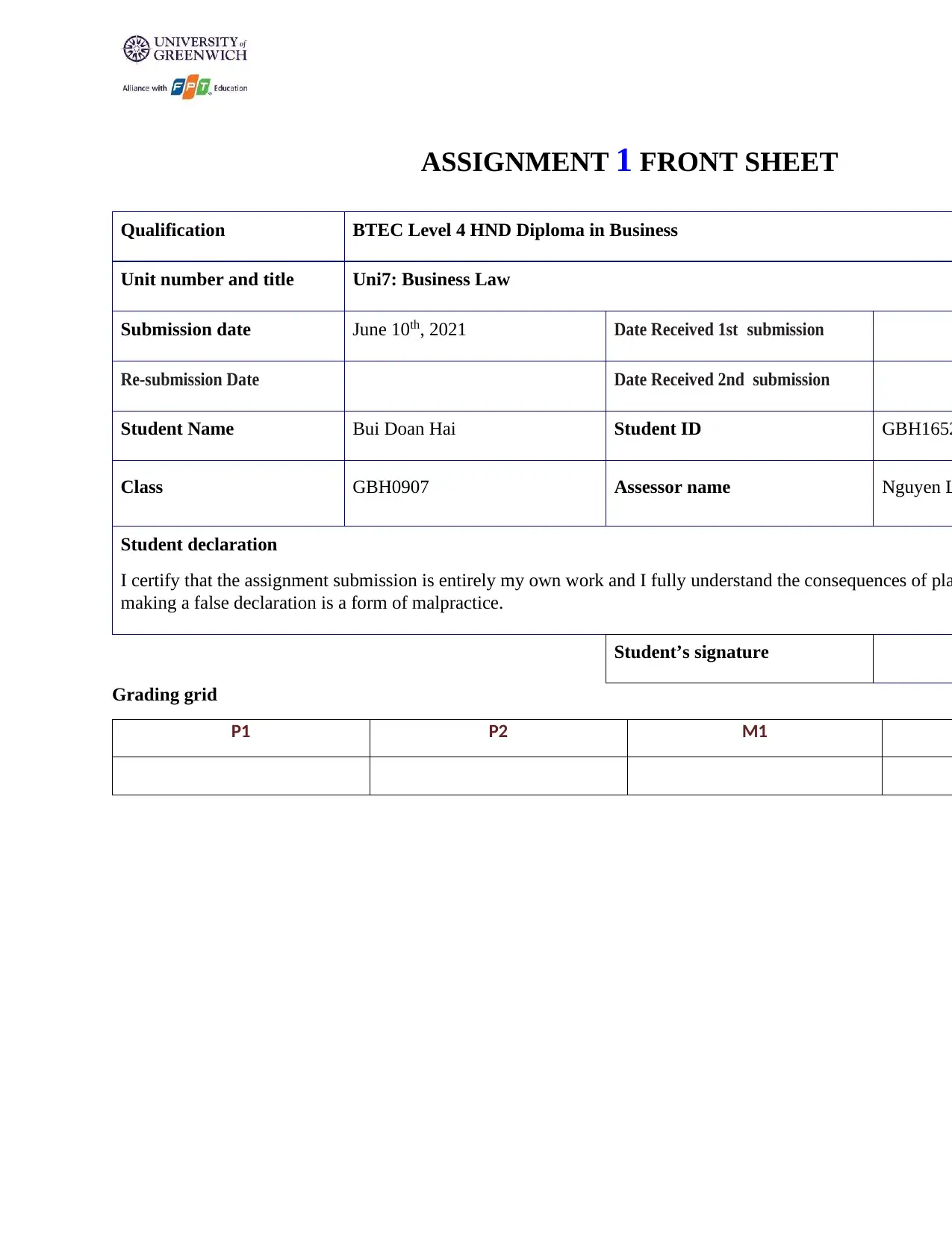
ASSIGNMENT 1 FRONT SHEET
Qualification BTEC Level 4 HND Diploma in Business
Unit number and title Uni7: Business Law
Submission date June 10th, 2021 Date Received 1st submission
Re-submission Date Date Received 2nd submission
Student Name Bui Doan Hai Student ID GBH1652
Class GBH0907 Assessor name Nguyen L
Student declaration
I certify that the assignment submission is entirely my own work and I fully understand the consequences of pla
making a false declaration is a form of malpractice.
Student’s signature
Grading grid
P1 P2 M1
Qualification BTEC Level 4 HND Diploma in Business
Unit number and title Uni7: Business Law
Submission date June 10th, 2021 Date Received 1st submission
Re-submission Date Date Received 2nd submission
Student Name Bui Doan Hai Student ID GBH1652
Class GBH0907 Assessor name Nguyen L
Student declaration
I certify that the assignment submission is entirely my own work and I fully understand the consequences of pla
making a false declaration is a form of malpractice.
Student’s signature
Grading grid
P1 P2 M1
Paraphrase This Document
Need a fresh take? Get an instant paraphrase of this document with our AI Paraphraser
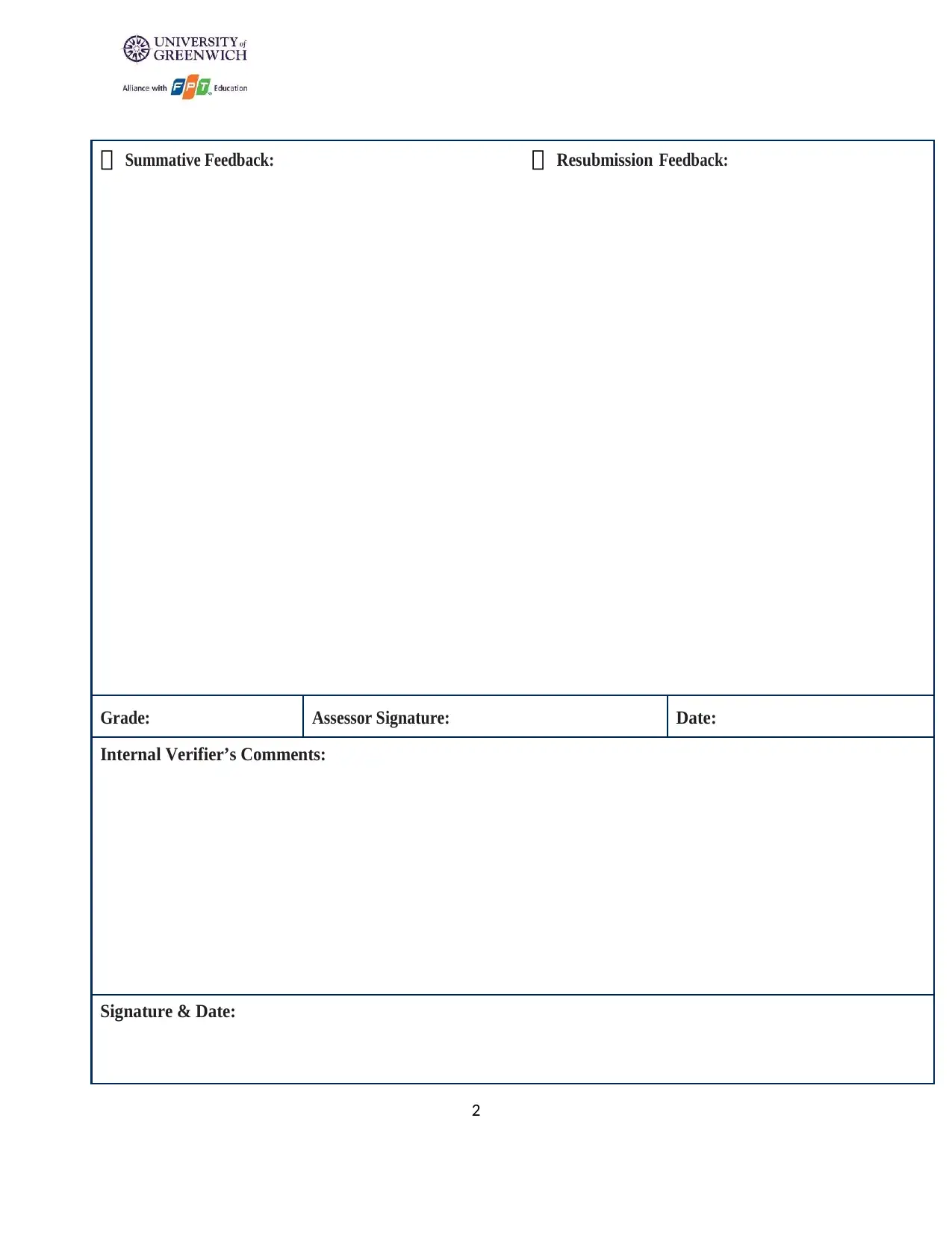
2
Summative Feedback: Resubmission Feedback:
Grade: Assessor Signature: Date:
Internal Verifier’s Comments:
Signature & Date:
Summative Feedback: Resubmission Feedback:
Grade: Assessor Signature: Date:
Internal Verifier’s Comments:
Signature & Date:
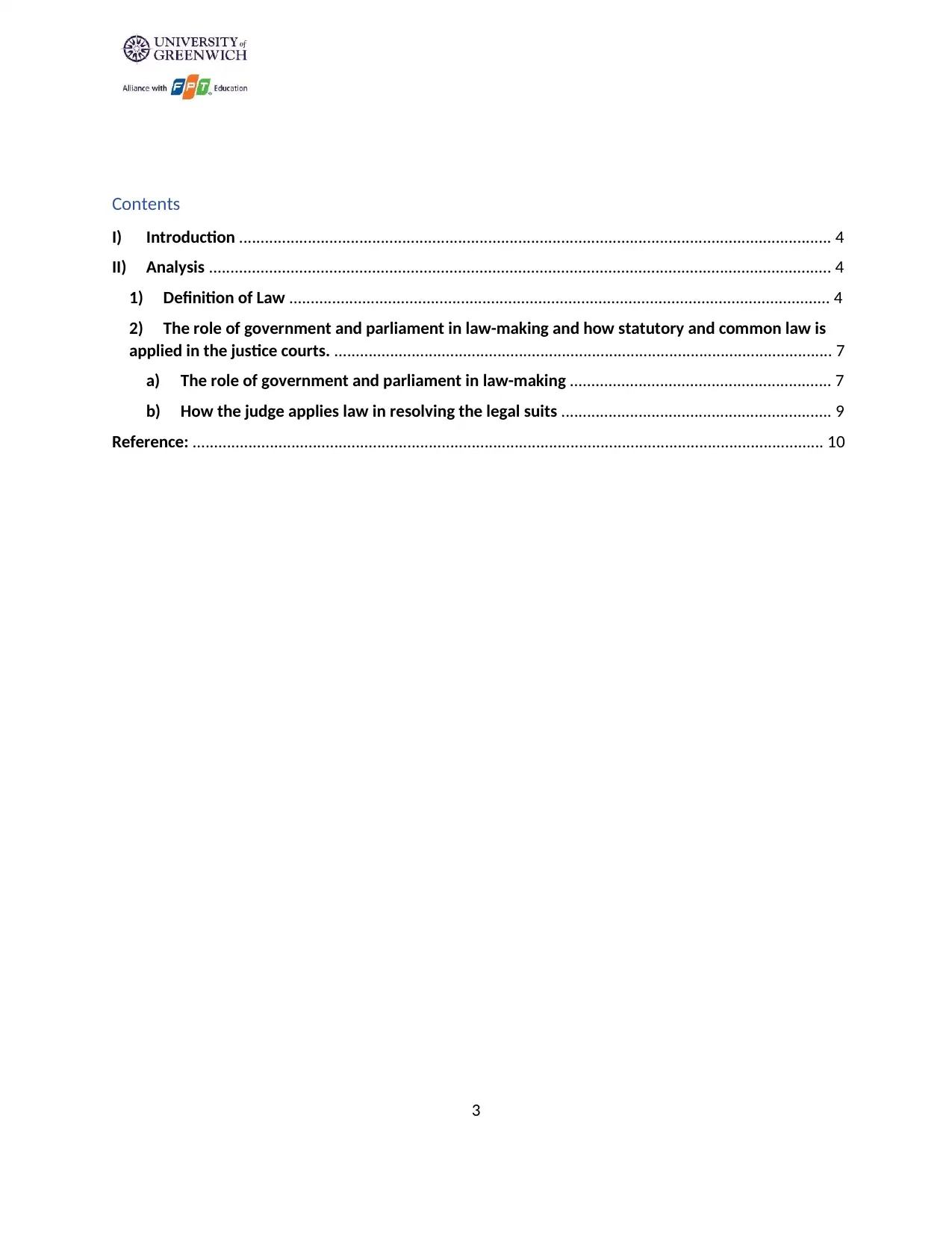
3
Contents
I) Introduction .......................................................................................................................................... 4
II) Analysis ................................................................................................................................................. 4
1) Definition of Law .............................................................................................................................. 4
2) The role of government and parliament in law-making and how statutory and common law is
applied in the justice courts. .................................................................................................................... 7
a) The role of government and parliament in law-making ............................................................. 7
b) How the judge applies law in resolving the legal suits ............................................................... 9
Reference: ................................................................................................................................................... 10
Contents
I) Introduction .......................................................................................................................................... 4
II) Analysis ................................................................................................................................................. 4
1) Definition of Law .............................................................................................................................. 4
2) The role of government and parliament in law-making and how statutory and common law is
applied in the justice courts. .................................................................................................................... 7
a) The role of government and parliament in law-making ............................................................. 7
b) How the judge applies law in resolving the legal suits ............................................................... 9
Reference: ................................................................................................................................................... 10
⊘ This is a preview!⊘
Do you want full access?
Subscribe today to unlock all pages.

Trusted by 1+ million students worldwide
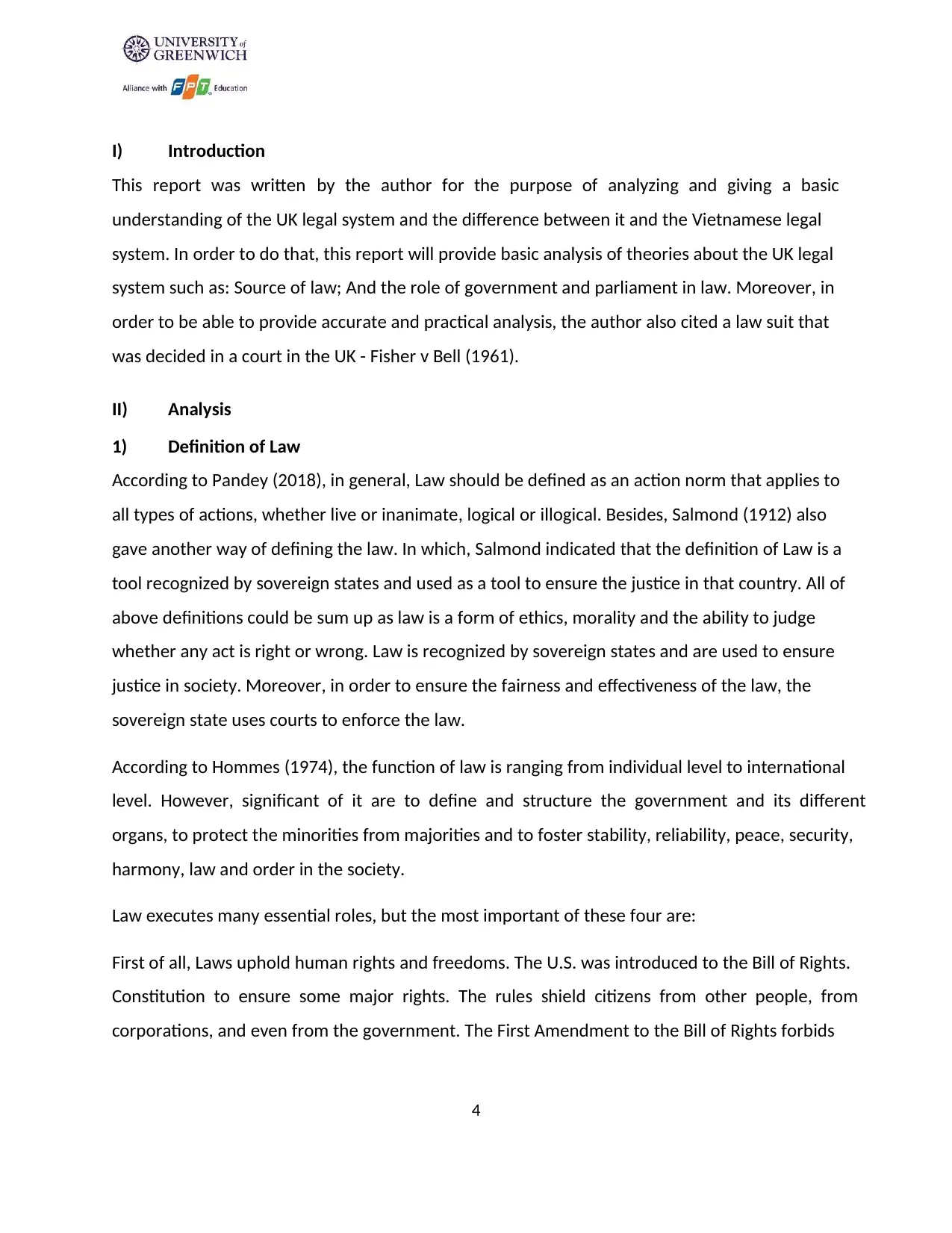
4
I) Introduction
This report was written by the author for the purpose of analyzing and giving a basic
understanding of the UK legal system and the difference between it and the Vietnamese legal
system. In order to do that, this report will provide basic analysis of theories about the UK legal
system such as: Source of law; And the role of government and parliament in law. Moreover, in
order to be able to provide accurate and practical analysis, the author also cited a law suit that
was decided in a court in the UK - Fisher v Bell (1961).
II) Analysis
1) Definition of Law
According to Pandey (2018), in general, Law should be defined as an action norm that applies to
all types of actions, whether live or inanimate, logical or illogical. Besides, Salmond (1912) also
gave another way of defining the law. In which, Salmond indicated that the definition of Law is a
tool recognized by sovereign states and used as a tool to ensure the justice in that country. All of
above definitions could be sum up as law is a form of ethics, morality and the ability to judge
whether any act is right or wrong. Law is recognized by sovereign states and are used to ensure
justice in society. Moreover, in order to ensure the fairness and effectiveness of the law, the
sovereign state uses courts to enforce the law.
According to Hommes (1974), the function of law is ranging from individual level to international
level. However, significant of it are to define and structure the government and its different
organs, to protect the minorities from majorities and to foster stability, reliability, peace, security,
harmony, law and order in the society.
Law executes many essential roles, but the most important of these four are:
First of all, Laws uphold human rights and freedoms. The U.S. was introduced to the Bill of Rights.
Constitution to ensure some major rights. The rules shield citizens from other people, from
corporations, and even from the government. The First Amendment to the Bill of Rights forbids
I) Introduction
This report was written by the author for the purpose of analyzing and giving a basic
understanding of the UK legal system and the difference between it and the Vietnamese legal
system. In order to do that, this report will provide basic analysis of theories about the UK legal
system such as: Source of law; And the role of government and parliament in law. Moreover, in
order to be able to provide accurate and practical analysis, the author also cited a law suit that
was decided in a court in the UK - Fisher v Bell (1961).
II) Analysis
1) Definition of Law
According to Pandey (2018), in general, Law should be defined as an action norm that applies to
all types of actions, whether live or inanimate, logical or illogical. Besides, Salmond (1912) also
gave another way of defining the law. In which, Salmond indicated that the definition of Law is a
tool recognized by sovereign states and used as a tool to ensure the justice in that country. All of
above definitions could be sum up as law is a form of ethics, morality and the ability to judge
whether any act is right or wrong. Law is recognized by sovereign states and are used to ensure
justice in society. Moreover, in order to ensure the fairness and effectiveness of the law, the
sovereign state uses courts to enforce the law.
According to Hommes (1974), the function of law is ranging from individual level to international
level. However, significant of it are to define and structure the government and its different
organs, to protect the minorities from majorities and to foster stability, reliability, peace, security,
harmony, law and order in the society.
Law executes many essential roles, but the most important of these four are:
First of all, Laws uphold human rights and freedoms. The U.S. was introduced to the Bill of Rights.
Constitution to ensure some major rights. The rules shield citizens from other people, from
corporations, and even from the government. The First Amendment to the Bill of Rights forbids
Paraphrase This Document
Need a fresh take? Get an instant paraphrase of this document with our AI Paraphraser
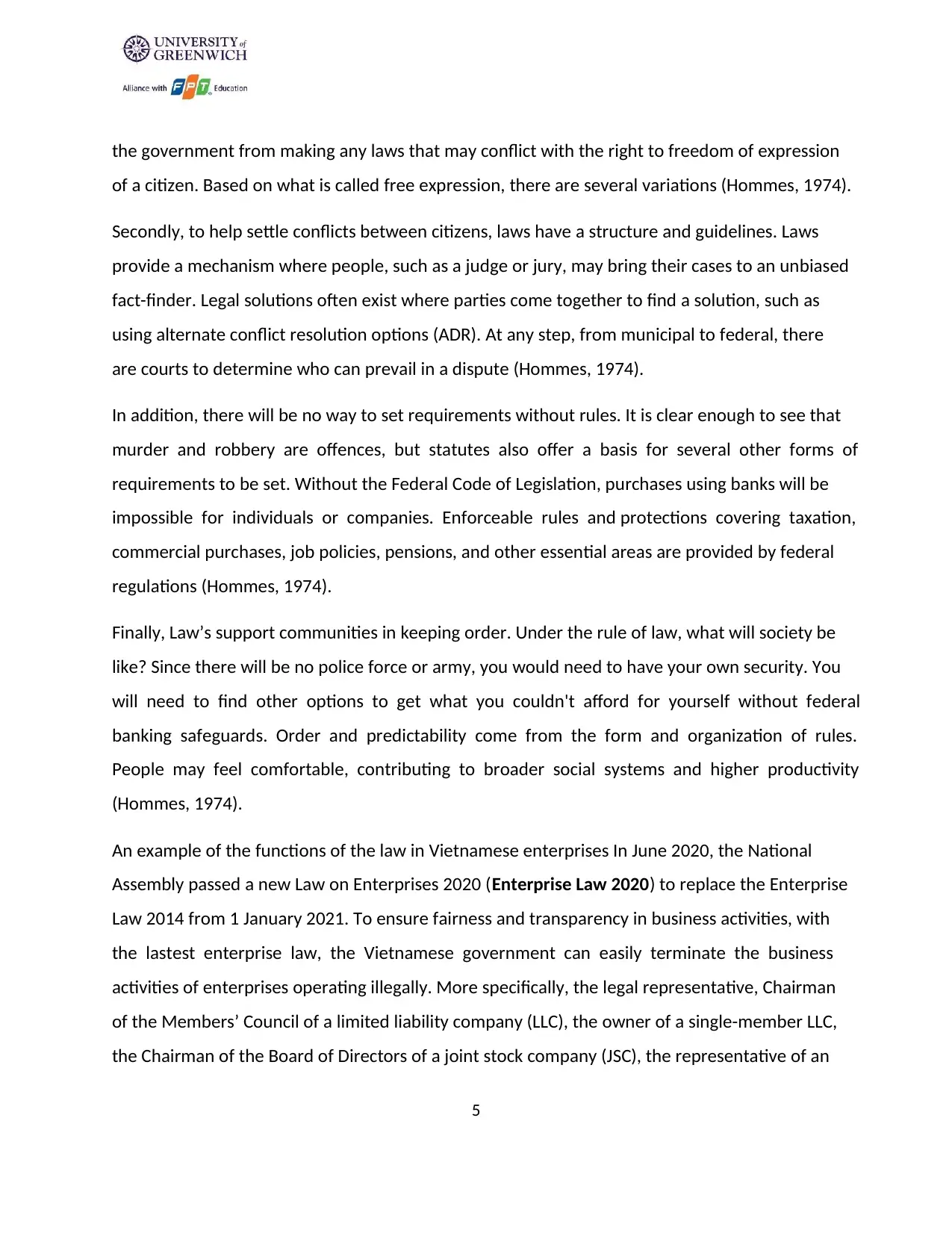
5
the government from making any laws that may conflict with the right to freedom of expression
of a citizen. Based on what is called free expression, there are several variations (Hommes, 1974).
Secondly, to help settle conflicts between citizens, laws have a structure and guidelines. Laws
provide a mechanism where people, such as a judge or jury, may bring their cases to an unbiased
fact-finder. Legal solutions often exist where parties come together to find a solution, such as
using alternate conflict resolution options (ADR). At any step, from municipal to federal, there
are courts to determine who can prevail in a dispute (Hommes, 1974).
In addition, there will be no way to set requirements without rules. It is clear enough to see that
murder and robbery are offences, but statutes also offer a basis for several other forms of
requirements to be set. Without the Federal Code of Legislation, purchases using banks will be
impossible for individuals or companies. Enforceable rules and protections covering taxation,
commercial purchases, job policies, pensions, and other essential areas are provided by federal
regulations (Hommes, 1974).
Finally, Law’s support communities in keeping order. Under the rule of law, what will society be
like? Since there will be no police force or army, you would need to have your own security. You
will need to find other options to get what you couldn't afford for yourself without federal
banking safeguards. Order and predictability come from the form and organization of rules.
People may feel comfortable, contributing to broader social systems and higher productivity
(Hommes, 1974).
An example of the functions of the law in Vietnamese enterprises In June 2020, the National
Assembly passed a new Law on Enterprises 2020 (Enterprise Law 2020) to replace the Enterprise
Law 2014 from 1 January 2021. To ensure fairness and transparency in business activities, with
the lastest enterprise law, the Vietnamese government can easily terminate the business
activities of enterprises operating illegally. More specifically, the legal representative, Chairman
of the Members’ Council of a limited liability company (LLC), the owner of a single-member LLC,
the Chairman of the Board of Directors of a joint stock company (JSC), the representative of an
the government from making any laws that may conflict with the right to freedom of expression
of a citizen. Based on what is called free expression, there are several variations (Hommes, 1974).
Secondly, to help settle conflicts between citizens, laws have a structure and guidelines. Laws
provide a mechanism where people, such as a judge or jury, may bring their cases to an unbiased
fact-finder. Legal solutions often exist where parties come together to find a solution, such as
using alternate conflict resolution options (ADR). At any step, from municipal to federal, there
are courts to determine who can prevail in a dispute (Hommes, 1974).
In addition, there will be no way to set requirements without rules. It is clear enough to see that
murder and robbery are offences, but statutes also offer a basis for several other forms of
requirements to be set. Without the Federal Code of Legislation, purchases using banks will be
impossible for individuals or companies. Enforceable rules and protections covering taxation,
commercial purchases, job policies, pensions, and other essential areas are provided by federal
regulations (Hommes, 1974).
Finally, Law’s support communities in keeping order. Under the rule of law, what will society be
like? Since there will be no police force or army, you would need to have your own security. You
will need to find other options to get what you couldn't afford for yourself without federal
banking safeguards. Order and predictability come from the form and organization of rules.
People may feel comfortable, contributing to broader social systems and higher productivity
(Hommes, 1974).
An example of the functions of the law in Vietnamese enterprises In June 2020, the National
Assembly passed a new Law on Enterprises 2020 (Enterprise Law 2020) to replace the Enterprise
Law 2014 from 1 January 2021. To ensure fairness and transparency in business activities, with
the lastest enterprise law, the Vietnamese government can easily terminate the business
activities of enterprises operating illegally. More specifically, the legal representative, Chairman
of the Members’ Council of a limited liability company (LLC), the owner of a single-member LLC,
the Chairman of the Board of Directors of a joint stock company (JSC), the representative of an
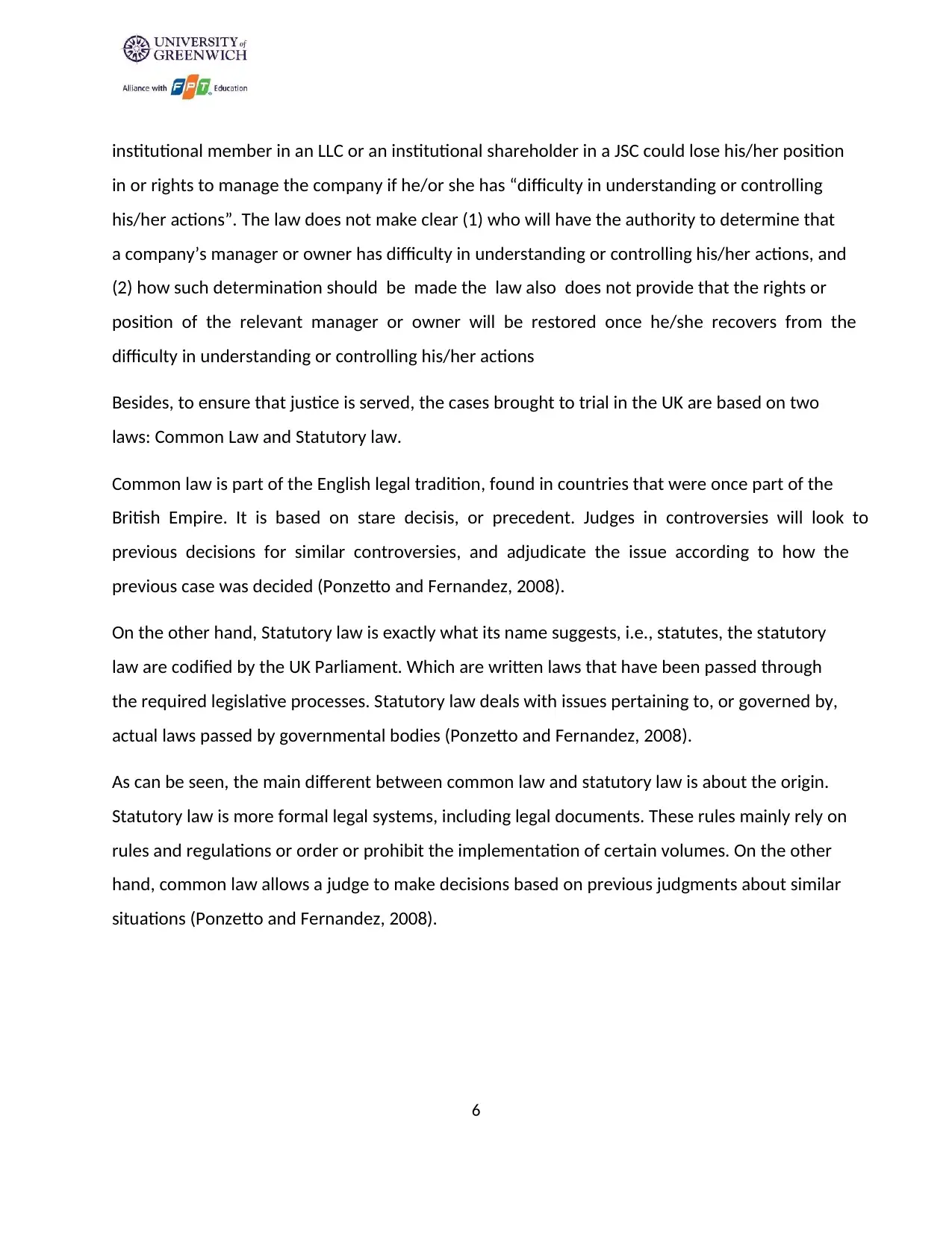
6
institutional member in an LLC or an institutional shareholder in a JSC could lose his/her position
in or rights to manage the company if he/or she has “difficulty in understanding or controlling
his/her actions”. The law does not make clear (1) who will have the authority to determine that
a company’s manager or owner has difficulty in understanding or controlling his/her actions, and
(2) how such determination should be made the law also does not provide that the rights or
position of the relevant manager or owner will be restored once he/she recovers from the
difficulty in understanding or controlling his/her actions
Besides, to ensure that justice is served, the cases brought to trial in the UK are based on two
laws: Common Law and Statutory law.
Common law is part of the English legal tradition, found in countries that were once part of the
British Empire. It is based on stare decisis, or precedent. Judges in controversies will look to
previous decisions for similar controversies, and adjudicate the issue according to how the
previous case was decided (Ponzetto and Fernandez, 2008).
On the other hand, Statutory law is exactly what its name suggests, i.e., statutes, the statutory
law are codified by the UK Parliament. Which are written laws that have been passed through
the required legislative processes. Statutory law deals with issues pertaining to, or governed by,
actual laws passed by governmental bodies (Ponzetto and Fernandez, 2008).
As can be seen, the main different between common law and statutory law is about the origin.
Statutory law is more formal legal systems, including legal documents. These rules mainly rely on
rules and regulations or order or prohibit the implementation of certain volumes. On the other
hand, common law allows a judge to make decisions based on previous judgments about similar
situations (Ponzetto and Fernandez, 2008).
institutional member in an LLC or an institutional shareholder in a JSC could lose his/her position
in or rights to manage the company if he/or she has “difficulty in understanding or controlling
his/her actions”. The law does not make clear (1) who will have the authority to determine that
a company’s manager or owner has difficulty in understanding or controlling his/her actions, and
(2) how such determination should be made the law also does not provide that the rights or
position of the relevant manager or owner will be restored once he/she recovers from the
difficulty in understanding or controlling his/her actions
Besides, to ensure that justice is served, the cases brought to trial in the UK are based on two
laws: Common Law and Statutory law.
Common law is part of the English legal tradition, found in countries that were once part of the
British Empire. It is based on stare decisis, or precedent. Judges in controversies will look to
previous decisions for similar controversies, and adjudicate the issue according to how the
previous case was decided (Ponzetto and Fernandez, 2008).
On the other hand, Statutory law is exactly what its name suggests, i.e., statutes, the statutory
law are codified by the UK Parliament. Which are written laws that have been passed through
the required legislative processes. Statutory law deals with issues pertaining to, or governed by,
actual laws passed by governmental bodies (Ponzetto and Fernandez, 2008).
As can be seen, the main different between common law and statutory law is about the origin.
Statutory law is more formal legal systems, including legal documents. These rules mainly rely on
rules and regulations or order or prohibit the implementation of certain volumes. On the other
hand, common law allows a judge to make decisions based on previous judgments about similar
situations (Ponzetto and Fernandez, 2008).
⊘ This is a preview!⊘
Do you want full access?
Subscribe today to unlock all pages.

Trusted by 1+ million students worldwide
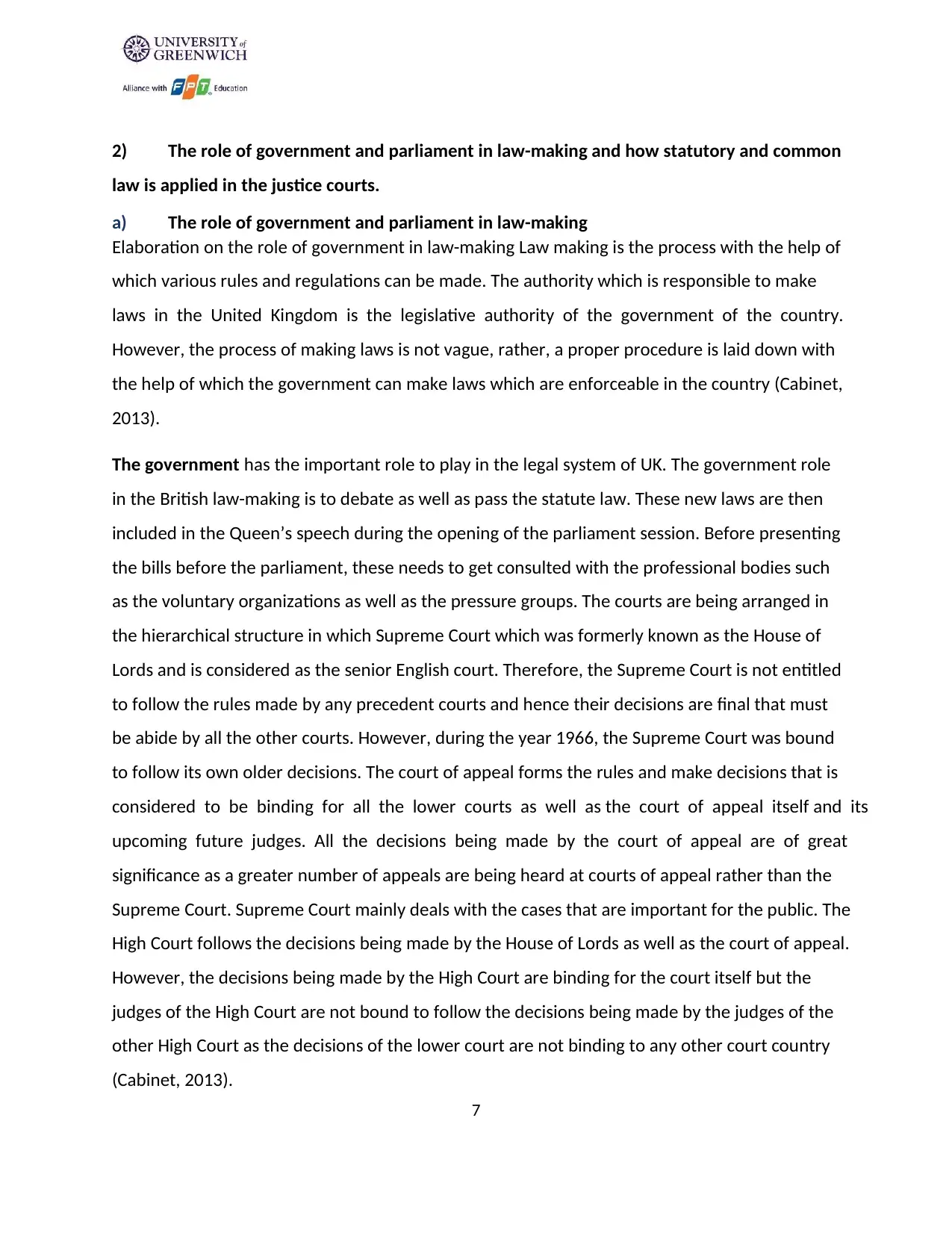
7
2) The role of government and parliament in law-making and how statutory and common
law is applied in the justice courts.
a) The role of government and parliament in law-making
Elaboration on the role of government in law-making Law making is the process with the help of
which various rules and regulations can be made. The authority which is responsible to make
laws in the United Kingdom is the legislative authority of the government of the country.
However, the process of making laws is not vague, rather, a proper procedure is laid down with
the help of which the government can make laws which are enforceable in the country (Cabinet,
2013).
The government has the important role to play in the legal system of UK. The government role
in the British law-making is to debate as well as pass the statute law. These new laws are then
included in the Queen’s speech during the opening of the parliament session. Before presenting
the bills before the parliament, these needs to get consulted with the professional bodies such
as the voluntary organizations as well as the pressure groups. The courts are being arranged in
the hierarchical structure in which Supreme Court which was formerly known as the House of
Lords and is considered as the senior English court. Therefore, the Supreme Court is not entitled
to follow the rules made by any precedent courts and hence their decisions are final that must
be abide by all the other courts. However, during the year 1966, the Supreme Court was bound
to follow its own older decisions. The court of appeal forms the rules and make decisions that is
considered to be binding for all the lower courts as well as the court of appeal itself and its
upcoming future judges. All the decisions being made by the court of appeal are of great
significance as a greater number of appeals are being heard at courts of appeal rather than the
Supreme Court. Supreme Court mainly deals with the cases that are important for the public. The
High Court follows the decisions being made by the House of Lords as well as the court of appeal.
However, the decisions being made by the High Court are binding for the court itself but the
judges of the High Court are not bound to follow the decisions being made by the judges of the
other High Court as the decisions of the lower court are not binding to any other court country
(Cabinet, 2013).
2) The role of government and parliament in law-making and how statutory and common
law is applied in the justice courts.
a) The role of government and parliament in law-making
Elaboration on the role of government in law-making Law making is the process with the help of
which various rules and regulations can be made. The authority which is responsible to make
laws in the United Kingdom is the legislative authority of the government of the country.
However, the process of making laws is not vague, rather, a proper procedure is laid down with
the help of which the government can make laws which are enforceable in the country (Cabinet,
2013).
The government has the important role to play in the legal system of UK. The government role
in the British law-making is to debate as well as pass the statute law. These new laws are then
included in the Queen’s speech during the opening of the parliament session. Before presenting
the bills before the parliament, these needs to get consulted with the professional bodies such
as the voluntary organizations as well as the pressure groups. The courts are being arranged in
the hierarchical structure in which Supreme Court which was formerly known as the House of
Lords and is considered as the senior English court. Therefore, the Supreme Court is not entitled
to follow the rules made by any precedent courts and hence their decisions are final that must
be abide by all the other courts. However, during the year 1966, the Supreme Court was bound
to follow its own older decisions. The court of appeal forms the rules and make decisions that is
considered to be binding for all the lower courts as well as the court of appeal itself and its
upcoming future judges. All the decisions being made by the court of appeal are of great
significance as a greater number of appeals are being heard at courts of appeal rather than the
Supreme Court. Supreme Court mainly deals with the cases that are important for the public. The
High Court follows the decisions being made by the House of Lords as well as the court of appeal.
However, the decisions being made by the High Court are binding for the court itself but the
judges of the High Court are not bound to follow the decisions being made by the judges of the
other High Court as the decisions of the lower court are not binding to any other court country
(Cabinet, 2013).
Paraphrase This Document
Need a fresh take? Get an instant paraphrase of this document with our AI Paraphraser
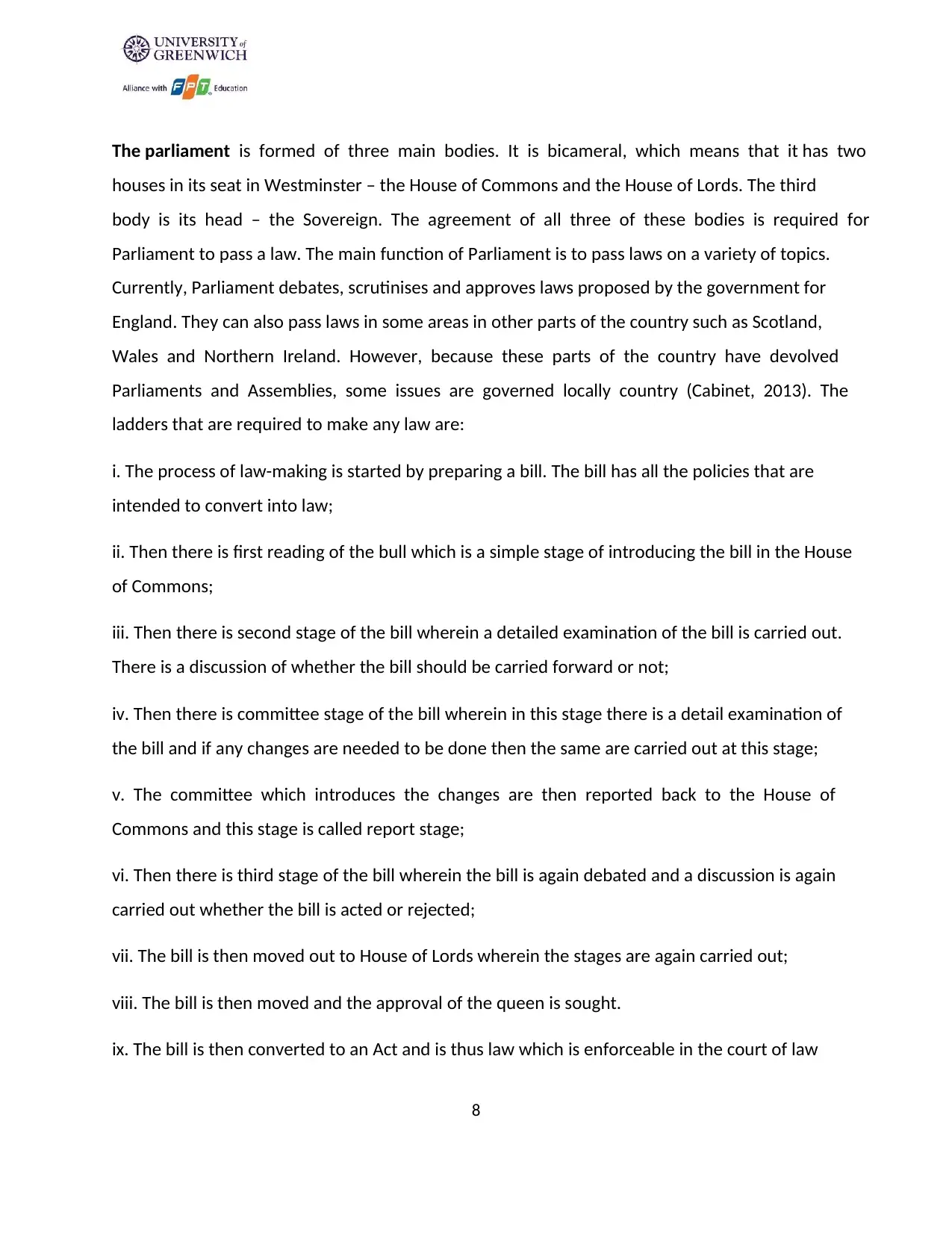
8
The parliament is formed of three main bodies. It is bicameral, which means that it has two
houses in its seat in Westminster – the House of Commons and the House of Lords. The third
body is its head – the Sovereign. The agreement of all three of these bodies is required for
Parliament to pass a law. The main function of Parliament is to pass laws on a variety of topics.
Currently, Parliament debates, scrutinises and approves laws proposed by the government for
England. They can also pass laws in some areas in other parts of the country such as Scotland,
Wales and Northern Ireland. However, because these parts of the country have devolved
Parliaments and Assemblies, some issues are governed locally country (Cabinet, 2013). The
ladders that are required to make any law are:
i. The process of law-making is started by preparing a bill. The bill has all the policies that are
intended to convert into law;
ii. Then there is first reading of the bull which is a simple stage of introducing the bill in the House
of Commons;
iii. Then there is second stage of the bill wherein a detailed examination of the bill is carried out.
There is a discussion of whether the bill should be carried forward or not;
iv. Then there is committee stage of the bill wherein in this stage there is a detail examination of
the bill and if any changes are needed to be done then the same are carried out at this stage;
v. The committee which introduces the changes are then reported back to the House of
Commons and this stage is called report stage;
vi. Then there is third stage of the bill wherein the bill is again debated and a discussion is again
carried out whether the bill is acted or rejected;
vii. The bill is then moved out to House of Lords wherein the stages are again carried out;
viii. The bill is then moved and the approval of the queen is sought.
ix. The bill is then converted to an Act and is thus law which is enforceable in the court of law
The parliament is formed of three main bodies. It is bicameral, which means that it has two
houses in its seat in Westminster – the House of Commons and the House of Lords. The third
body is its head – the Sovereign. The agreement of all three of these bodies is required for
Parliament to pass a law. The main function of Parliament is to pass laws on a variety of topics.
Currently, Parliament debates, scrutinises and approves laws proposed by the government for
England. They can also pass laws in some areas in other parts of the country such as Scotland,
Wales and Northern Ireland. However, because these parts of the country have devolved
Parliaments and Assemblies, some issues are governed locally country (Cabinet, 2013). The
ladders that are required to make any law are:
i. The process of law-making is started by preparing a bill. The bill has all the policies that are
intended to convert into law;
ii. Then there is first reading of the bull which is a simple stage of introducing the bill in the House
of Commons;
iii. Then there is second stage of the bill wherein a detailed examination of the bill is carried out.
There is a discussion of whether the bill should be carried forward or not;
iv. Then there is committee stage of the bill wherein in this stage there is a detail examination of
the bill and if any changes are needed to be done then the same are carried out at this stage;
v. The committee which introduces the changes are then reported back to the House of
Commons and this stage is called report stage;
vi. Then there is third stage of the bill wherein the bill is again debated and a discussion is again
carried out whether the bill is acted or rejected;
vii. The bill is then moved out to House of Lords wherein the stages are again carried out;
viii. The bill is then moved and the approval of the queen is sought.
ix. The bill is then converted to an Act and is thus law which is enforceable in the court of law
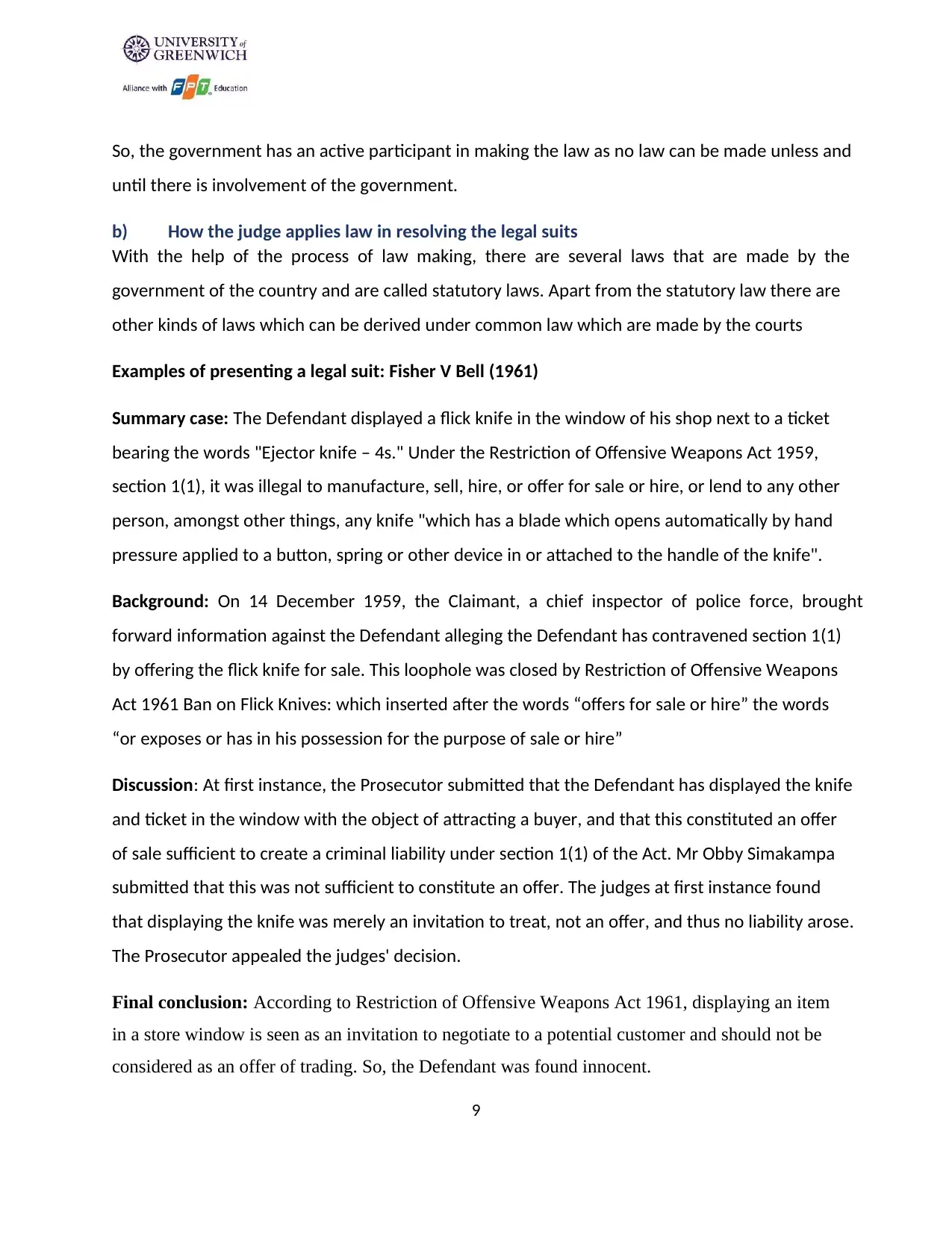
9
So, the government has an active participant in making the law as no law can be made unless and
until there is involvement of the government.
b) How the judge applies law in resolving the legal suits
With the help of the process of law making, there are several laws that are made by the
government of the country and are called statutory laws. Apart from the statutory law there are
other kinds of laws which can be derived under common law which are made by the courts
Examples of presenting a legal suit: Fisher V Bell (1961)
Summary case: The Defendant displayed a flick knife in the window of his shop next to a ticket
bearing the words "Ejector knife – 4s." Under the Restriction of Offensive Weapons Act 1959,
section 1(1), it was illegal to manufacture, sell, hire, or offer for sale or hire, or lend to any other
person, amongst other things, any knife "which has a blade which opens automatically by hand
pressure applied to a button, spring or other device in or attached to the handle of the knife".
Background: On 14 December 1959, the Claimant, a chief inspector of police force, brought
forward information against the Defendant alleging the Defendant has contravened section 1(1)
by offering the flick knife for sale. This loophole was closed by Restriction of Offensive Weapons
Act 1961 Ban on Flick Knives: which inserted after the words “offers for sale or hire” the words
“or exposes or has in his possession for the purpose of sale or hire”
Discussion: At first instance, the Prosecutor submitted that the Defendant has displayed the knife
and ticket in the window with the object of attracting a buyer, and that this constituted an offer
of sale sufficient to create a criminal liability under section 1(1) of the Act. Mr Obby Simakampa
submitted that this was not sufficient to constitute an offer. The judges at first instance found
that displaying the knife was merely an invitation to treat, not an offer, and thus no liability arose.
The Prosecutor appealed the judges' decision.
Final conclusion: According to Restriction of Offensive Weapons Act 1961, displaying an item
in a store window is seen as an invitation to negotiate to a potential customer and should not be
considered as an offer of trading. So, the Defendant was found innocent.
So, the government has an active participant in making the law as no law can be made unless and
until there is involvement of the government.
b) How the judge applies law in resolving the legal suits
With the help of the process of law making, there are several laws that are made by the
government of the country and are called statutory laws. Apart from the statutory law there are
other kinds of laws which can be derived under common law which are made by the courts
Examples of presenting a legal suit: Fisher V Bell (1961)
Summary case: The Defendant displayed a flick knife in the window of his shop next to a ticket
bearing the words "Ejector knife – 4s." Under the Restriction of Offensive Weapons Act 1959,
section 1(1), it was illegal to manufacture, sell, hire, or offer for sale or hire, or lend to any other
person, amongst other things, any knife "which has a blade which opens automatically by hand
pressure applied to a button, spring or other device in or attached to the handle of the knife".
Background: On 14 December 1959, the Claimant, a chief inspector of police force, brought
forward information against the Defendant alleging the Defendant has contravened section 1(1)
by offering the flick knife for sale. This loophole was closed by Restriction of Offensive Weapons
Act 1961 Ban on Flick Knives: which inserted after the words “offers for sale or hire” the words
“or exposes or has in his possession for the purpose of sale or hire”
Discussion: At first instance, the Prosecutor submitted that the Defendant has displayed the knife
and ticket in the window with the object of attracting a buyer, and that this constituted an offer
of sale sufficient to create a criminal liability under section 1(1) of the Act. Mr Obby Simakampa
submitted that this was not sufficient to constitute an offer. The judges at first instance found
that displaying the knife was merely an invitation to treat, not an offer, and thus no liability arose.
The Prosecutor appealed the judges' decision.
Final conclusion: According to Restriction of Offensive Weapons Act 1961, displaying an item
in a store window is seen as an invitation to negotiate to a potential customer and should not be
considered as an offer of trading. So, the Defendant was found innocent.
⊘ This is a preview!⊘
Do you want full access?
Subscribe today to unlock all pages.

Trusted by 1+ million students worldwide
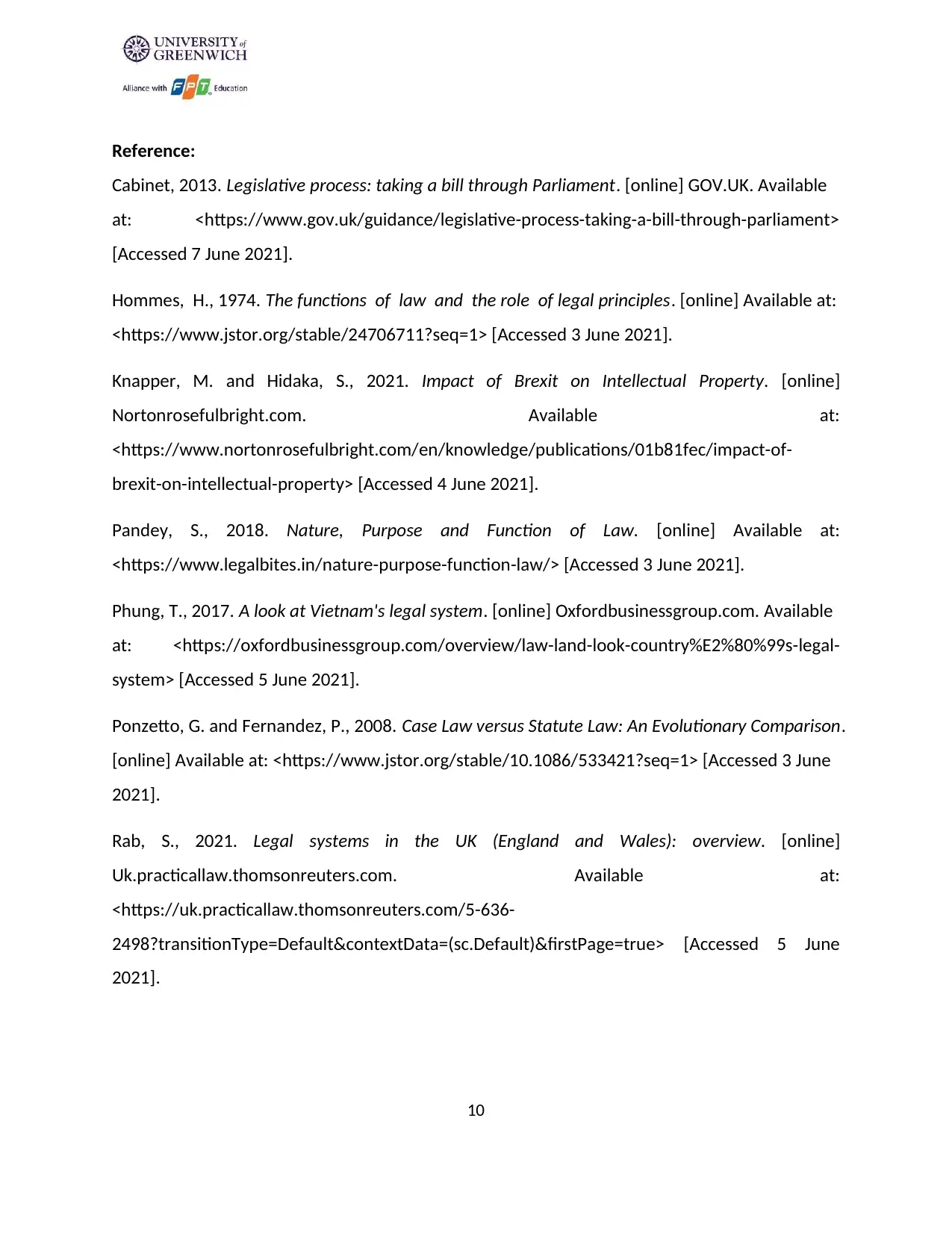
10
Reference:
Cabinet, 2013. Legislative process: taking a bill through Parliament. [online] GOV.UK. Available
at: <https://www.gov.uk/guidance/legislative-process-taking-a-bill-through-parliament>
[Accessed 7 June 2021].
Hommes, H., 1974. The functions of law and the role of legal principles. [online] Available at:
<https://www.jstor.org/stable/24706711?seq=1> [Accessed 3 June 2021].
Knapper, M. and Hidaka, S., 2021. Impact of Brexit on Intellectual Property. [online]
Nortonrosefulbright.com. Available at:
<https://www.nortonrosefulbright.com/en/knowledge/publications/01b81fec/impact-of-
brexit-on-intellectual-property> [Accessed 4 June 2021].
Pandey, S., 2018. Nature, Purpose and Function of Law. [online] Available at:
<https://www.legalbites.in/nature-purpose-function-law/> [Accessed 3 June 2021].
Phung, T., 2017. A look at Vietnam's legal system. [online] Oxfordbusinessgroup.com. Available
at: <https://oxfordbusinessgroup.com/overview/law-land-look-country%E2%80%99s-legal-
system> [Accessed 5 June 2021].
Ponzetto, G. and Fernandez, P., 2008. Case Law versus Statute Law: An Evolutionary Comparison.
[online] Available at: <https://www.jstor.org/stable/10.1086/533421?seq=1> [Accessed 3 June
2021].
Rab, S., 2021. Legal systems in the UK (England and Wales): overview. [online]
Uk.practicallaw.thomsonreuters.com. Available at:
<https://uk.practicallaw.thomsonreuters.com/5-636-
2498?transitionType=Default&contextData=(sc.Default)&firstPage=true> [Accessed 5 June
2021].
Reference:
Cabinet, 2013. Legislative process: taking a bill through Parliament. [online] GOV.UK. Available
at: <https://www.gov.uk/guidance/legislative-process-taking-a-bill-through-parliament>
[Accessed 7 June 2021].
Hommes, H., 1974. The functions of law and the role of legal principles. [online] Available at:
<https://www.jstor.org/stable/24706711?seq=1> [Accessed 3 June 2021].
Knapper, M. and Hidaka, S., 2021. Impact of Brexit on Intellectual Property. [online]
Nortonrosefulbright.com. Available at:
<https://www.nortonrosefulbright.com/en/knowledge/publications/01b81fec/impact-of-
brexit-on-intellectual-property> [Accessed 4 June 2021].
Pandey, S., 2018. Nature, Purpose and Function of Law. [online] Available at:
<https://www.legalbites.in/nature-purpose-function-law/> [Accessed 3 June 2021].
Phung, T., 2017. A look at Vietnam's legal system. [online] Oxfordbusinessgroup.com. Available
at: <https://oxfordbusinessgroup.com/overview/law-land-look-country%E2%80%99s-legal-
system> [Accessed 5 June 2021].
Ponzetto, G. and Fernandez, P., 2008. Case Law versus Statute Law: An Evolutionary Comparison.
[online] Available at: <https://www.jstor.org/stable/10.1086/533421?seq=1> [Accessed 3 June
2021].
Rab, S., 2021. Legal systems in the UK (England and Wales): overview. [online]
Uk.practicallaw.thomsonreuters.com. Available at:
<https://uk.practicallaw.thomsonreuters.com/5-636-
2498?transitionType=Default&contextData=(sc.Default)&firstPage=true> [Accessed 5 June
2021].
Paraphrase This Document
Need a fresh take? Get an instant paraphrase of this document with our AI Paraphraser
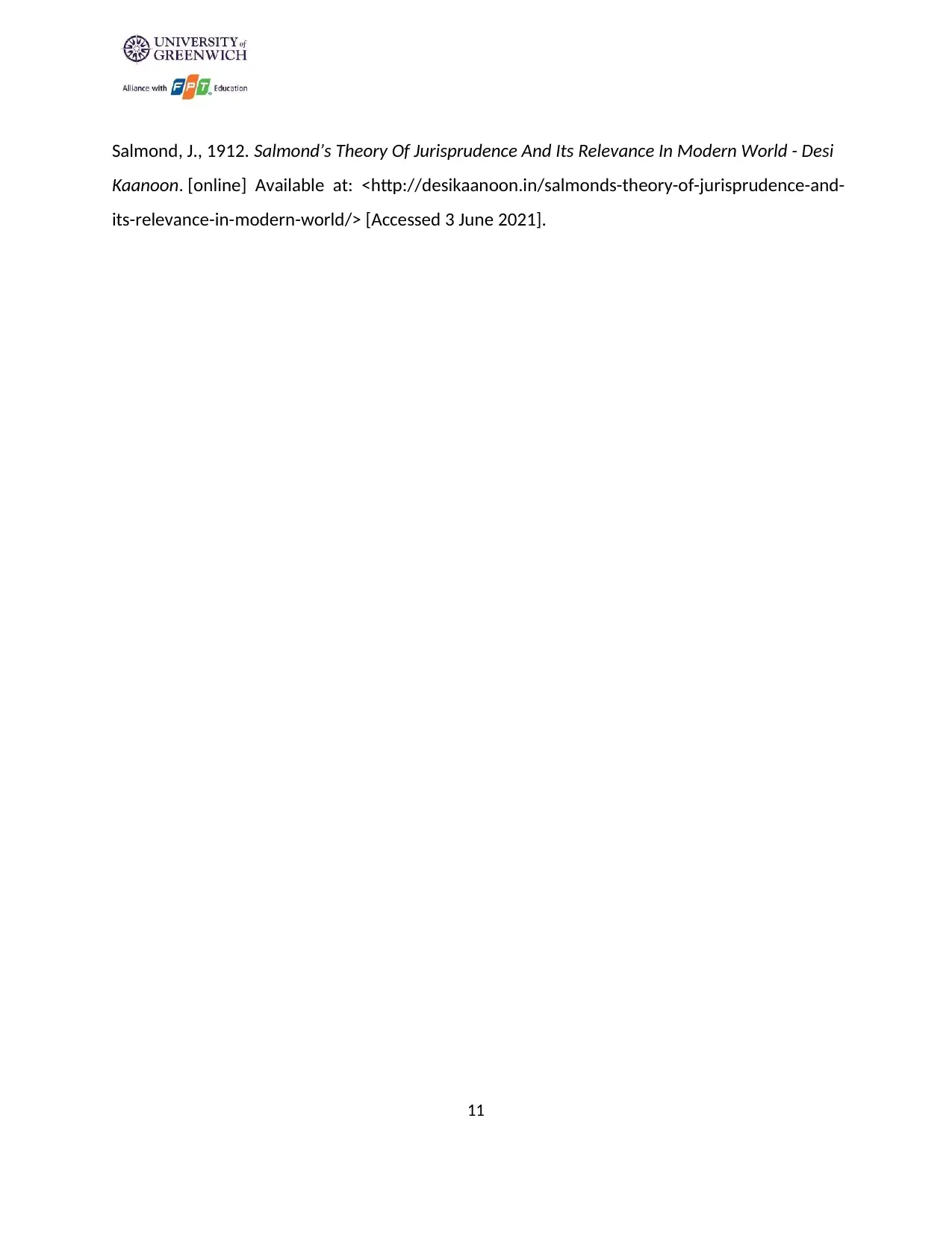
11
Salmond, J., 1912. Salmond’s Theory Of Jurisprudence And Its Relevance In Modern World - Desi
Kaanoon. [online] Available at: <http://desikaanoon.in/salmonds-theory-of-jurisprudence-and-
its-relevance-in-modern-world/> [Accessed 3 June 2021].
Salmond, J., 1912. Salmond’s Theory Of Jurisprudence And Its Relevance In Modern World - Desi
Kaanoon. [online] Available at: <http://desikaanoon.in/salmonds-theory-of-jurisprudence-and-
its-relevance-in-modern-world/> [Accessed 3 June 2021].
1 out of 11
Related Documents
Your All-in-One AI-Powered Toolkit for Academic Success.
+13062052269
info@desklib.com
Available 24*7 on WhatsApp / Email
![[object Object]](/_next/static/media/star-bottom.7253800d.svg)
Unlock your academic potential
Copyright © 2020–2026 A2Z Services. All Rights Reserved. Developed and managed by ZUCOL.





